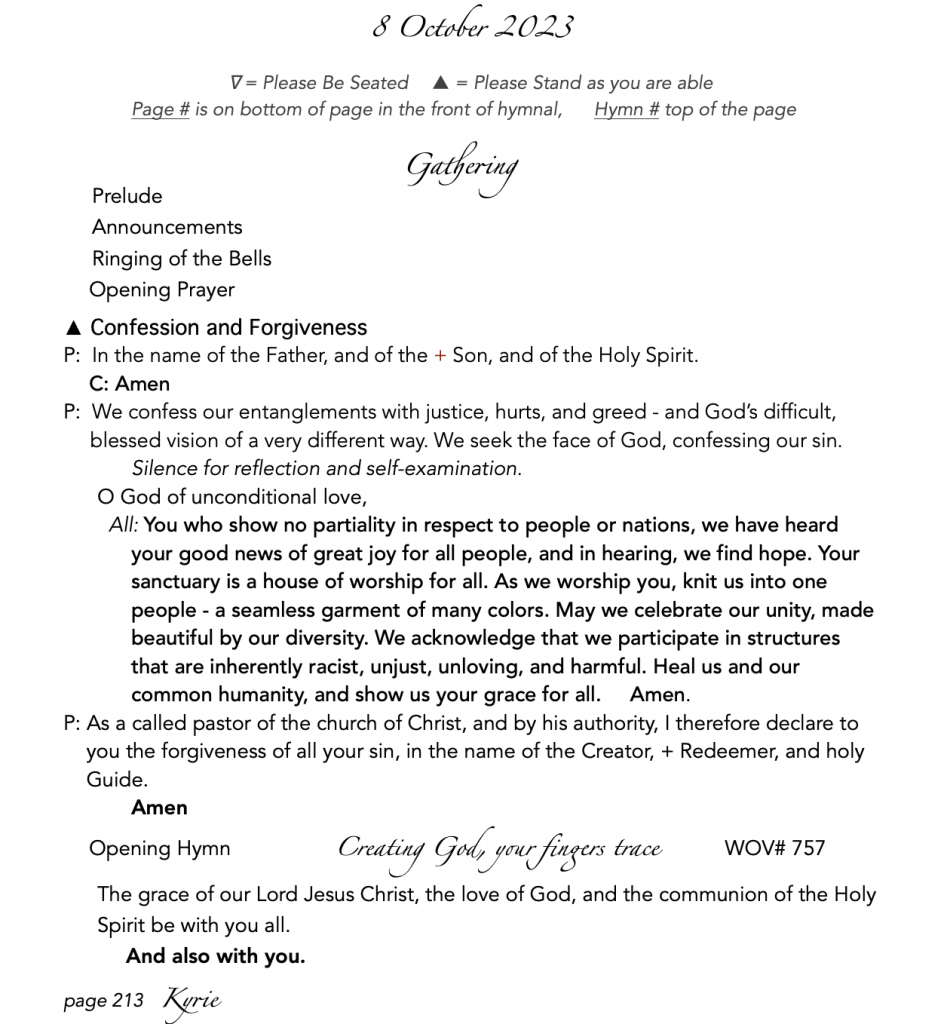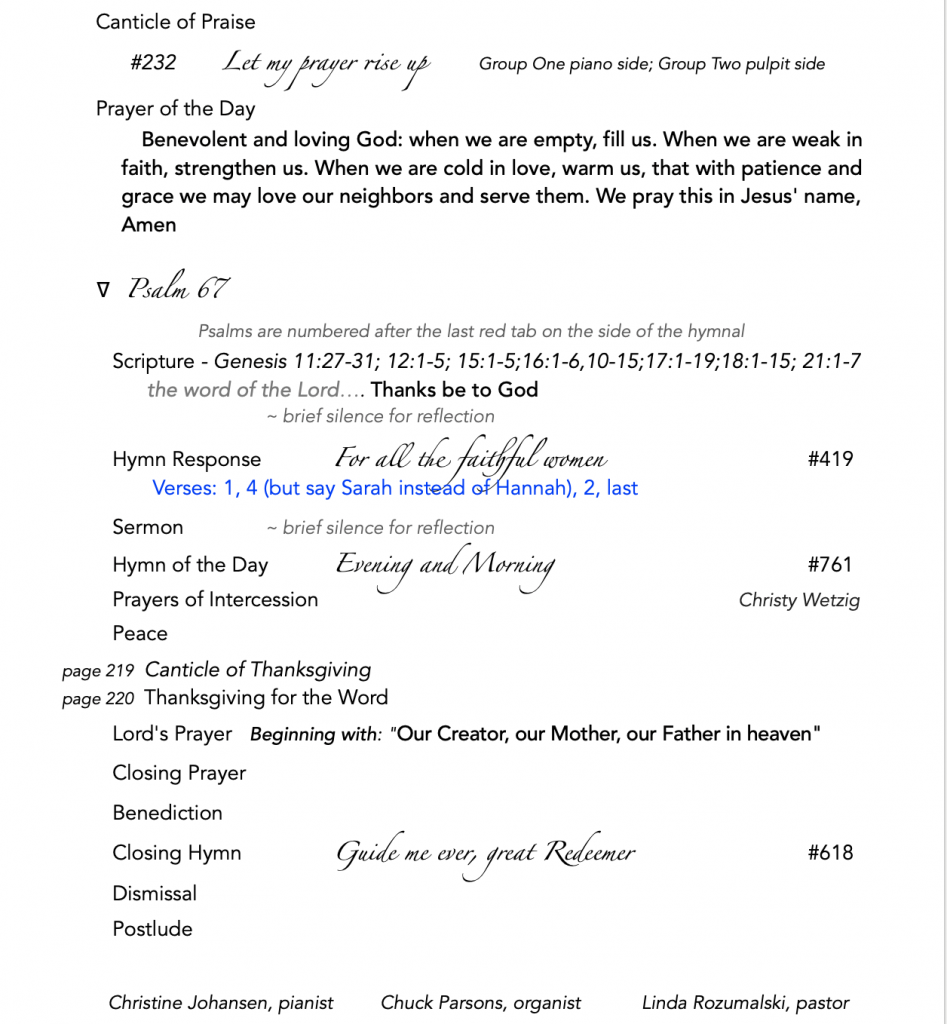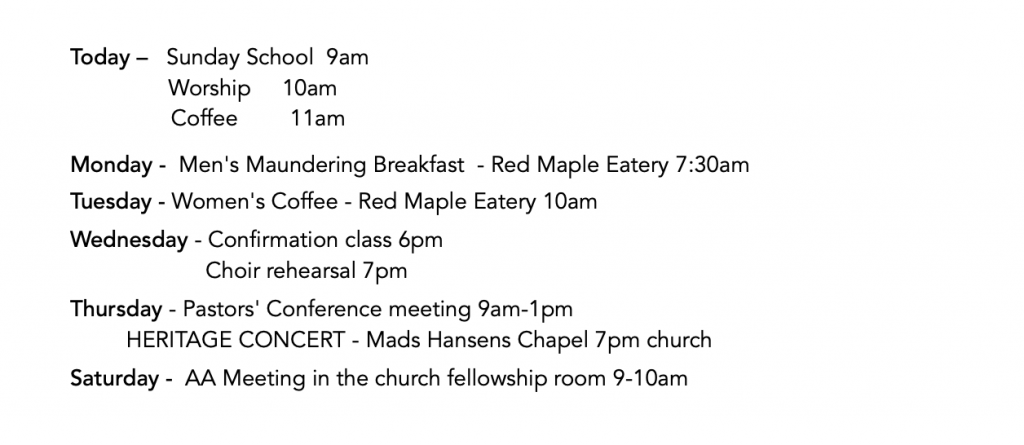


Genesis 11:27-31; 12:1-5; 15:1-5; 16:1-6,10-15;17:1-19;18:1-15; 21:1-7
Abraham and Sarah populate one of the longest narratives of the Bible. As you can tell by the verses listed, I’m skipping a lot of the story in order to get you out by noon. I’m not even telling the best parts. The red thread I’m following is the promise God made to Sarah. The last two sections are the appointed readings for the day. But our story begins at the end of Genesis chapter 11 as the list of Noah’s descendants winds up.
11:27 “Terah was the father of Abram, Nahor, and Haran; and Haran was the father of Lot. 29Abram and Nahor took wives; the name of Abram’s wife was Sarai. 30Now Sarai was barren; she had no child.
31 Terah took his son Abram and his grandson Lot, son of Haran who had died, and his daughter-in-law Sarai, and they went out together from Ur of the Chaldeans to go into the land of Canaan; but when they came to Haran, they settled there.
12:1 The Lord said to Abram, ‘Go from your country and your kindred and your father’s house to the land that I will show you. I will make of you a great nation, and I will bless you, and make your name great, so that you will be a blessing. I will bless those who bless you, and the one who curses you I will curse; and by you all the families of the earth shall bless themselves.’
So Abram went, as the Lord had told him; and Lot went with him. Abram was seventy-five years old when he departed from Haran. Abram took his wife Sarai and his brother’s son Lot, and all the possessions that they had gathered, and the persons whom they had acquired, and flocks and herds; and they set forth to go to the land of Canaan.
15:1 The word of the Lord came to Abram in a vision, ‘Do not be afraid, Abram, I am your shield; your reward shall be very great.’ 2But Abram said, ‘O Lord God, what will you give me, for I continue childless, and the heir of my house is Eliezer of Damascus? You have given me no offspring, and so a slave born in my house is to inherit this reward.’ 4But the word of the Lord came to him, ‘This man shall not be your heir; no one but your very own issue shall be your heir.’ 5He brought Abram outside and said, ‘Look towards heaven and count the stars, if you are able to count them.’ Then he said, ‘So shall your descendants be.’
16:1 Now Sarai, Abram’s wife, bore him no children. She had an Egyptian slave-girl whose name was Hagar, 2and Sarai said to Abram, ‘You see that the Lord has prevented me from bearing children; go in to my slave-girl; it may be that I shall obtain children by her.’ And Abram listened to the voice of Sarai. 3So, after Abram had lived for ten years in the land of Canaan, Sarai took Hagar the Egyptian, her slave-girl, and gave her to her husband Abram as a wife. 4He went in to Hagar, and she conceived; and when she saw that she had conceived, she looked with contempt on her mistress.
6But Abram said to Sarai, ‘Your slave-girl is in your power; do to her as you please.’ Then Sarai dealt harshly with her, and she ran away from her.
9The angel of the Lord found Hagar by a spring of water in the wilderness,10and said to her, ‘I will so greatly multiply your offspring that they cannot be counted for multitude.’ 11‘Now you have conceived and shall bear a son; you shall call him Ishmael, for the Lord has given heed to your affliction. 15 Hagar bore Abram a son; and Abram named his son Ishmael. 16Abram was eighty-six years old when Hagar bore him Ishmael.
17:1 When Abram was ninety-nine years old, the Lord appeared and said to him, ‘I am El Shaddai, the God Almighty; walk before me, and be blameless. 2And I will make my covenant between me and you, and will make you exceedingly numerous.’ 3Then Abram fell on his face; and God said to him, 4‘As for me, this is my covenant with you: You shall be the ancestor of a multitude of nations. 5No longer shall your name be Abram (exalted ancestor), but your name shall be Abraham (ancestor of a multitude). 6I will make you exceedingly fruitful; and I will make nations of you, and kings shall come from you. 7I will establish my covenant between me and you, and your offspring after you throughout their generations, … to be God to you and to your seed. 8And I will give to you the land where you are now an alien for a perpetual holding; and I will be the God of you.’
God said to Abraham, ‘As for Sarai your wife, you shall not call her Sarai, but Sarah shall be her name. 16I will bless her, and moreover I will give you a son by her… and she shall give rise to nations; kings of peoples shall come from her.’
17But Abraham fell on his face and laughed, and said to himself, ‘Can a child be born to a man who is a hundred years old? Can Sarah, who is ninety years old, bear a child?’ And Abraham said to God, ‘O that Ishmael might live in your sight!’ 19God said, ‘No, but your wife Sarah shall bear you a son, and you shall name him Isaac. (which means ‘he laughs’)
18:1 One day, the Lord appeared to Abraham by the oaks of Mamre, as he sat at the entrance of his tent in the heat of the day. 2He looked up and saw three men standing near him. When he saw them, he ran from the tent entrance to meet them, and bowed down to the ground. 3He said, ‘My lords, if I find favor with you, do not pass by your servant. 4Let a little water be brought, and wash your feet, and rest yourselves under the tree. 5Let me bring a little bread, that you may refresh yourselves, and after that you may pass on—since you have come to your servant.’ So they said, ‘Do as you have said.’ 6And Abraham hastened into the tent to Sarah, and said, ‘Make ready quickly three measures of choice flour, knead it, and make cakes.’ 7Abraham ran to the herd, and took a calf, tender and good, and gave it to the servant, who hastened to prepare it. 8Then he took curds and milk and the calf that he had prepared, and set it before them; and he stood by them under the tree while they ate.
9 They said to him, ‘Where is your wife Sarah?’ And he said, ‘There, in the tent.’ 10Then one said, ‘I will surely return to you in due season, and your wife Sarah shall have a son.’ Sarah was listening at the tent entrance behind him. 11Now Abraham and Sarah were old, advanced in age; it had ceased to be with Sarah after the manner of women. 12And Sarah laughed to herself, saying, ‘After I have grown old, and my husband is old, shall I have pleasure?’ 13The Lord said to Abraham, ‘Why did Sarah laugh, and say, “Shall I indeed bear a child, now that I am old?” 14Is anything too wonderful for the Lord? At the set time I will return to you, in due season, and Sarah shall have a son.’ 15But Sarah denied, saying, ‘I did not laugh’; for she was afraid. He said, ‘Oh yes, you did laugh.’
21 The Lord dealt with Sarah as he had said, and the Lord did for Sarah as he had promised. Sarah conceived and bore Abraham a son in his old age, at the time of which God had spoken to him. Abraham gave the name Isaac to his son whom Sarah bore him. Abraham was a hundred years old when his son Isaac was born to him. Now Sarah said, ‘God has brought laughter for me; everyone who hears will laugh with me.’ And she said, ‘Who would ever have said to Abraham that Sarah would nurse children? Yet I have borne him a son in his old age.’
I have included this long list of occasions in which the promise of an heir was made for a couple of reasons.
One is that it shows the span of years that Sarah and Abraham waited. She knew she was barren all along, so we might wonder how much stock she actually put in the word of Abraham the first three times when he told her the Lord had spoken to him about being the father of nations. At any rate, these two old people are accustomed to hopelessness in this regard. Given their ages, the length of their marriage, I imagine they might even be sleeping in different tents.
Anticipation has surely flagged in the 24 years between the first time the promise was given to a 75 year old Abram and this latest iteration. The time was past. Sarah was barren, still.
The only difference this time is that Sarah hears it, too.
And she can’t help but laugh. She laughed to herself, and then denied it out of fear. These words interest me. In email or texting, one can’t read in the inflection to aid interpretation; one can’t see facial expressions – all we have is the words that can be – and usually are – misinterpreted. And the little smiley faces – emojis that try to give a sense of meaning.
So, what kind of laughter do you imagine Sarah laughed? The Oxford dictionary says this about laughter: “Most commonly, it is considered an auditory expression of a number of positive emotional states, such as joy, mirth, happiness, or relief. On some occasions, however, it may be caused by contrary emotional states such as embarrassment, surprise, or confusion such as nervous laughter or courtesy laugh.”
I’ve always pictured Sarah, hiding behind the tent flap, leaning in, overhearing every word, suddenly bursting out with a loud, impulsive guffaw. She can’t help it. I mean look at her. Look at Abraham, ten years her senior. “Shall I indeed have pleasure,” she says? There is a healthy dose of skepticism in that laugh.
Perhaps, though, it is complete mirth: a girly, incongruous, joyous giggle. She is looking forward to it – to the whole prospect, the whole promise, the rounded belly, breasts no longer wrinkled and saggy. And the funny, transformed self image makes her titter.
Or, perhaps, Sarah has had a bit too much of Abraham – his noteworthy attempt to pass her off as his sister, giving her to the pharaoh was a selfish act on Abraham’s part to save his own life at the expense of Sarah because he knew she was barren and so now ‘harm’ cold come from it. Great thinking. Coming on the back of that, this might sound like a bit too much, “You gotta be kidding me,” she laughs with derision.
Or, maybe Sarah is thinking of Hagar and Ishmael, and of regaining her stature, her place in the hierarchy of women in the camp. And she laughs as one who’s been given the last laugh.
Or perhaps she was telling the truth. Maybe Sarah didn’t laugh at all, but was expressing ridicule and scorn. “Who the heck does this stranger think he is. We’ve had enough of this nonsense. I’m 90 years old! Take your full stomach and get on your way; leave us in peace.”
We don’t know what she thought of this news – except that she laughed to herself as she overheard the news and that laugh was in turn overheard by God who noticed – and she was afraid. ‘Oh yes, you did laugh.’ Maybe Sarah was afraid that God doesn’t have a sense of humor when one is certainly needed. Most likely, she is embarrassed and was suddenly afraid of these three very odd guests who can read minds and knew her name and promise her, at last, the child long promised to Abraham. For an old woman to bear a child and give birth… there’s a lot to be afraid of. I put a picture of my mom and her great grandchild on the bulletin to give a bit of reality to the concept.
But, again, as in the past week’s stories, this is’t told as documented history or a case study in geriatric pregnancy. It’s told about God, the nature of God. The word translated as ‘wonderful’ – “is anything too wonderful for God?” Is translated other places as extraordinary. I like that meaning of it here. Is anything too out of the ordinary for God to do or to notice? The Bible could have begun with the Law or with the histories when they put the books in order. But they started with retelling their origin stories to establish that God was there from before the beginning, forming, choosing, guiding them as a nation, but told through individuals. God is that concerned, that involved, that specific.
The second reason I added all those readings is to establish the sense of prolonged waiting for the promise. The final form of Genesis is believed to have been compiled by editors during or shortly after their return from exile in Babylon in the 6th century BCE. These were people needing desperately to hear a word of promise that there is new life possible born out of the barrenness of their exile experience. Returning home was almost worse than being captive, because there was nothing left of their homes, their villages, cities, temple. Foreign people were living on their land, calling it home.
What did God’s promise mean to them now? What good was it? They had been gone for a full generation. Isaiah had spoken of the desert bursting into bloom, springs gushing up, a highway appearing to usher them home. What kind of laughter do you imagine they produced faced with the reality of their barrenness, their hopelessness and insecurity and lack of a future. They were Sarah, displaced by her handmaid. And it had been a long time since the promise was made of land flowing with milk and honey. It was a long time since they heard God speak their name. Was the promise still true for them, or had God given up this chosen people – Worse yet, was God not able to transform their desert, deserted experience into a life-giving reality? Was it not possible for God to fulfill those old promises? Sarah’s laughter was perhaps close to despair.
Except she says something that I think is not by chance, we just can’t hear it. She says it to herself, and in Hebrew. “After I have grown old, and my husband has grown old, shall I have pleasure?”
The term in Hebrew for the word pleasure is a cognate for Eden. It implies moistness, fertility, creation. These messengers of God are not promising a return to Eden, but Sarah is promised the pleasure of this creative possibility of Eden located within her barren womb. I can imagine that would have been a powerful word to the exiles. Shall I indeed have pleasure? Is it possible for God to create life in me?
If this is told for ancient Israel struggling with self-doubt and an existential crisis of faith, what does it have to do with us?
Have you never cleaned yourself into a corner? Left a floor swept, washed and spotless, but left yourself nowhere to go? I and my desk were sent to a corner in third grade once and I still remember the shame, that sense of fear, the closed in view of a corner. The sense of being called out and caught. Some people live there. Have you ever suffered from doubt about your worth or value or ability? Have you ever wondered if you are on God’s radar, are of any consequence?
These are the questions of the story. They are Sarah’s questions from behind the tent flap – and then she hears the promise that is for her. If you can believe that God’s desire is for creative, jubilant, abundant pleasure and that it is intended for you, would you be willing to make changes that get you out of your familiar, but miserable corner? Can you imagine a world-view governed by promise and gift rather than judgment and law? Can you turn Sarah’s laughter of disbelief and derision into childlike surprise and mirth?
Promise and hope are important words of faith. Especially now, when so much of the world and climate seems to be falling apart. And as we head into the first hard frost and sing the requiem for dahlia buds and green tomatoes and fall-bearing raspberries that don’t have time to ripen. Maybe you’re done with the garden and just want to put it to bed. Maybe you’ve given up on those dreams or extraordinary hopes from earlier in your life. But this word is as true for you as it was for the ancient Israelites – God intends abundant, fertile wonder-filled life – even for you. Can you imagine that? Maybe we should try.
And maybe we should laugh more.